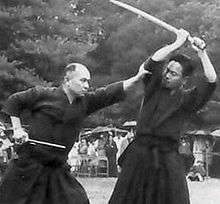Jittejutsu
Jittejutsu (十手術) is the Japanese martial art[1] of using the Japanese weapon jitte (also known as jutte in English-language sources).[2] Jittejutsu was evolved mainly for the law enforcement officers of the Edo period[3] to enable non-lethal disarmament and apprehension of criminals who were usually carrying a sword.[4] Besides the use of striking an assailant on the head, wrists, hands and arms like that of a baton, the jitte can also be used for blocking, deflecting and grappling a sword in the hands of a skilled user.[5]
 Kuroda Ichitaro and Kaminoda Tsunemori of Shintō Musō-ryū performing Ikkaku-ryū juttejutsu | |
| Focus | Weaponry (jitte) |
|---|---|
| Hardness | non-competitive |
| Country of origin | |
| Creator | unknown |
| Parenthood | historic |
| Olympic sport | no |
There are several schools of jittejutsu today and various jitte influences and techniques are featured in several martial arts.[6]
See also
- Ikkaku-ryū juttejutsu, a school of jittejutsu featured exclusively in the martial arts school Shintō Musō-ryū
References
- "large-jitte-with-purple-ribbon".
- "Japanese-English translation :: jitte :: Dictionary". kanjijapanese.com. Retrieved 2019-02-22.
- "Life_in_Medieval_and_Early_Modern_Japan".
- Yasuka, Author (2014-05-19). "Koryū: The Ancient Japanese Martial Arts". KCP International. Retrieved 2019-02-22.
- Mol, Serge (2003). Classical Weaponry of Japan: Special Weapons and Tactics of the Martial Arts. Kodansha International. ISBN 9784770029416.
- Niten, Instituto. "Ancient Schools". Instituto Cultural Niten. Retrieved 2019-02-22.
This article is issued from Wikipedia. The text is licensed under Creative Commons - Attribution - Sharealike. Additional terms may apply for the media files.